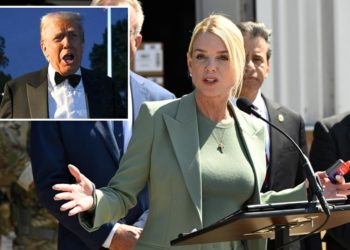San Diego City Councilmember Marni von Wilpert doesn’t generally agree with political parties redrawing congressional maps to gain power.
But after President Trump persuaded Texas Gov. Greg Abbott to redraw his state’s maps in order to improve Republican chances of retaining control of Congress in 2026, Von Wilpert said she decided California’s only option was to fight back with new maps of its own, favoring Democrats.
There’s too much at stake for LGBTQ+ people and other marginalized Californians to do otherwise, said Von Wilpert — who is bisexual and running to unseat Republican incumbent Rep. Darrell Issa, a Trump ally whose district in San Diego and Riverside counties will be redrawn if voters approve the plan.
“We can’t sit on the sidelines anymore and just hope that the far right will play fair or play by the rule book,” said Von Wilpert, 42. “If we don’t fight back now, I don’t know what democracy is going to be left for us to fight for in the future.”
Von Wilpert’s challenge to Issa — who did not respond to a request for comment — makes her part of a growing wave of LGBTQ+ candidates running for office at a time when many on the right and in the Trump administration are working aggressively to push queer people out of the American mainstream, including by challenging drag queen performances, queer library books and an array of Pride displays, and by questioning transgender people’s right to serve in the military, receive gender-affirming healthcare, participate in sports or use public restrooms.
They are running to counter those efforts, but also to resist other administration policies that they believe threaten democracy and equality more broadly, and to advocate around local issues that are important to them and their neighbors, said Elliot Imse, executive director of the LGBTQ+ Victory Institute.
The institute, which has trained queer people on running for and holding political office since 1991, has already provided 450 people with in-person training so far this year, compared with 290 people all of last year, Imse said. It recently had to cap a training in Los Angeles at 54 people — its largest cohort in more than a decade — and a first-of-its-kind training for transgender candidates at 12 people, despite more than 50 applying.
“LGBTQ+ people have been extremely motivated to run for office across the country because of the attacks on their equality,” Imse said. “They know the risk, they know the potential for harassment, but those fears are really overcome by the desire to make a difference in this moment.”
“This isn’t about screaming we are trans, this is about screaming we are human — and showing that we are here, that we are competent leaders,” said Josie Caballero, voting and elections director at Advocates for Trans Equality, which helped run the training.
Across the country
Queer candidates still face stiff resistance in some parts of the country. But they are winning elections elsewhere like never before — Rep. Sarah McBride of Delaware became the first out transgender member of Congress last year — and increasingly deciding to run.
Some are Republicans who support Trump and credit him with kicking open the political door for people like them by installing gay leaders in his administration, such as Treasury Secretary Scott Bessent.
Ed Williams, executive director of the Log Cabin Republicans, an LGBTQ+ organization, said his group has seen “a surge in interest” under Trump, with “new members and chapters springing up across the country.” He said that “LGBT conservatives stand with President Trump’s fight for commonsense policies that support our schools and parents, put America first, and create opportunities for all Americans.”
Ryan Sheridan, 35, a gay psychiatric nurse practitioner challenging fellow Republican incumbent Rep. Ann Wagner for her House seat in Missouri, said Trump has made the Republican Party a “more welcoming environment” for gay people. He said he agrees with Trump that medical interventions for transgender youth should be stopped, but also believes others in the LGBTQ+ community misunderstand the president’s perspective.
“I do not believe that he is anti-trans. I do not believe he is anti-gay,” Sheridan said. “I understand the fear might be real, but I would encourage anybody that is deeply fearful to explore some alternative points of view.”
Many more LGBTQ+ candidates, however, are Democrats or progressives — and say they were driven to run in part by their disdain for Trump and his policies.
JoAnna Mendoza, a bisexual retired U.S. Marine, said she is running to unseat Rep. Juan Ciscomani (R-Ariz.) because she took an oath to defend the U.S. and its values, and she believes those values are under threat from an administration with no respect for LGBTQ+ service members, immigrants or other vulnerable groups.
Mike Simmons, the first out LGBTQ+ state senator in Illinois, is running for the House seat of retiring Rep. Jan Schakowsky (D-Ill.) and leaning into his outsider persona as a gay Black man and the son of an Ethiopian asylum seeker. “I symbolize everything Donald Trump is trying to erase.”
Texas state Rep. Jolanda Jones, who is a lesbian, said she is running for the House seat of the late Rep. Sylvester Turner (D-Texas), in a historically Black district being redrawn in Houston, because she believes “we need more gay people — but specifically Black gay people — to run and be in a position to challenge Trump.”
Colorado state Rep. Brianna Titone, who is running for Colorado treasurer, said it is critical for LGBTQ+ people — especially transgender people like her — to run, including locally. Trump is looking for ways to attack blue state economies, she said, and queer people need to help ensure resistance strategies don’t include abandoning LGBTQ+ rights.
“We’re going to be extorted, and our economy is going to suffer for that, and we’re going to have to withstand that,” she said.
Jordan Wood, who is gay, served as chief of staff to former Rep. Katie Porter of Orange County before co-founding the Constitution-backing organization democracyFIRST. He’s now back in his native Maine challenging centrist Republican incumbent Sen. Susan Collins.
Collins, who declined to comment, has supported LGBTQ+ rights in the past, including in military service and marriage, and has at times broken with her party to stand in Trump’s way. However, Wood said Collins has acquiesced to Trump’s autocratic policies, including in recent budget battles.
“This is a moment with our country in crisis where we need our political leaders to pick sides and to stand up to this administration and its lawlessness,” Wood said.
Candidates said they’ve had hateful and threatening comments directed toward them because of their identities, and tough conversations with their families about what it will mean to be a queer elected official in the current political moment. The Victory Institute training included information on how best to handle harassment on the campaign trail.
However, candidates said they also have had young people and others thank them for having the nerve to defend the LGBTQ+ community.
Kevin Morrison, a gay county commissioner in the Chicago suburbs who is running for the House seat of Rep. Raja Krishnamoorthi (D-Ill.), who is running for Senate, recently had that experience after defending a transgender high school athlete at a local school board meeting.
Morrison said the response he got from the community, including many of the school’s alumni, was “incredibly positive” — and showed how ready people are for new LGBTQ+ advocates in positions of power who “lead from a place of empathy and compassion.”
In California
LGBTQ+ candidates are running across California — which has been a national leader in electing LGBTQ+ candidates, but never had an out transgender state representative.
Maebe Pudlo, 39, is an operations manager for the SELAH Neighborhood Homeless Coalition and an elected member of the Silver Lake Neighborhood Council. She is also transgender, and running for the Central and East L.A. state Senate seat of María Elena Durazo, who is running for county supervisor.
Pudlo, who also works as a drag queen, said that simply existing each day is a “political and social statement” for her. But she decided to run for office after seeing policy decisions affecting transgender people made without any transgender voices at the table.
“Unfortunately, our lives have been politicized and trans people have become political pawns, and it’s really disgusting to me,” Pudlo said.
Like every other queer candidate who spoke to The Times, Pudlo, who has previously run for Congress, said her platform is about more than LGBTQ+ issues. It’s also about housing and healthcare and defending democracy more broadly, she said, noting her campaign slogan is “Keep Fascism Out of California.”
Still, Pudlo said she is keenly aware of the current political threats to transgender people, and feels a deep responsibility to defend their rights — for everyone’s sake.
“This whole idea of rolling back civil rights for trans people specifically — that should be concerning for anybody who cares about democracy,” Pudlo said. “Because if they’ll do it to my community, your community is next.”
Juan Camacho, a 44-year-old Echo Park resident also running for Durazo’s seat, said he feels a similar responsibility as a gay Mexican immigrant — particularly as Trump rolls out the “Project 2025 playbook” of attacking immigrants, Latinos and LGBTQ+ people, he said.
Brought to the U.S. by his parents as a toddler before becoming documented under President Reagan’s amnesty program, Camacho said he understands the fear that undocumented and mixed-status families feel, and he wants to use his privilege as a citizen now to push back.
Veteran California legislative leader Toni Atkins, who has long been out and is now running for governor, said the recent attacks on LGBTQ+ and especially transgender people have been “pretty disheartening,” but have also strengthened her resolve — after 50 years of LGBTQ+ people gaining rights in this country — to keep fighting.
“It’s what it’s always been: We want housing and healthcare and we want equal opportunity and we want to be seen as contributing members of society,” she said. “We have a responsibility to be visible and, as Harvey Milk said, to ‘give them hope.’”
The post ‘We can’t sit on the sidelines’: LGBTQ+ candidates step up amid threats to queer rights appeared first on Los Angeles Times.




